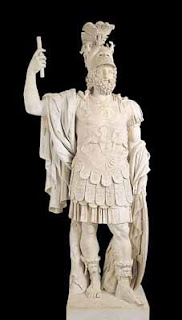
Humans are meaning seeking creatures. It is an undeniable human characteristic. Against all the chaotic and depressing evidence to the contrary, we seek out meaning and are on personal quests to fill our lives with some degree of purpose. It may seem foolish sometimes, but it is an unquestionably human drive. One of the key ways that this impulse is manifested is through mythology.
Mythology isn’t something that happened in the past; some ancient, misaligned quasi-religious belief. Mythology may be based in the past, and many times is based on a historical event or figure, but what defines a functional, relevant myth is that it is something that we are experiencing over and over again in our daily lives. It’s an occurrence that has been liberated from a particular time period and has been brought into our contemporary lives.
Take for example Jesus. Jesus was a historical figure that lived and was killed around 30 c.e. He had devotees and influence over a set number of people who believe that he died and rose from the dead. This is historical fact. But it wasn’t until years after his death that people like St. Paul began to mythologize the figure of Jesus. St. Paul had very little concern for the particulars of Jesus’ teachings or the events of his life—at least, he mentions them very little in his writings. Rather, he was concerned with the mystery of Jesus—especially regarding his death and resurrection. Paul wanted to bring this character out of the past and into the present. He succeeded, and Jesus has become an enduring mythological figure, someone that Christians experience on a daily basis now, in the 21st century. They experience him through both ritual (studying scripture, going to church, taking the Eurcharist) and through action (leading a life according to Jesus’ teachings). Thus, Jesus has become a spiritual reality. His death and resurrection happened once, and now, it happens over and over again.
In the past, things were no different. Myths allowed our ancestors to relate to their surroundings, and to the forces that they believed sacred. It allowed them to experience divinity. The gods were all around them and they saw their handiwork daily. To them, the gods were inseparable from love, passion, anger, storms, the sea, and the quiet beauty of nature. Myths lifted them out of this mundane existence and gave them the ability to see the world with new eyes. Myths addressed timeless truths, fears, desires, and pointed them in the direction of a life more richly endowed.
 Freud and Jung had an interesting take on Roman and Greek mythology. They looked at these gods and likened them to facets of our personalities. They proposed that these characters were archetypes from the collective unconscious, and the tales they existed within embodied universal truths that were universally relatable. Freud and Jung then went one step further and posed the question—could not these gods be the emotions and feelings that we experience on a daily basis? Perhaps Mars, the god of war was simply another way of understanding aggression, and so when the Romans spoke of him, they simply referred to a person being consumed with rage. Perhaps by personifying this emotion, it helped the ancient Greeks understand themselves and how they related to the universe around them, just as the mythology of Jesus helps modern Christians participate in the divine.
Freud and Jung had an interesting take on Roman and Greek mythology. They looked at these gods and likened them to facets of our personalities. They proposed that these characters were archetypes from the collective unconscious, and the tales they existed within embodied universal truths that were universally relatable. Freud and Jung then went one step further and posed the question—could not these gods be the emotions and feelings that we experience on a daily basis? Perhaps Mars, the god of war was simply another way of understanding aggression, and so when the Romans spoke of him, they simply referred to a person being consumed with rage. Perhaps by personifying this emotion, it helped the ancient Greeks understand themselves and how they related to the universe around them, just as the mythology of Jesus helps modern Christians participate in the divine.
Can it not be said that a human is a microcosm of the entire universe, composed of the same basic stuff in different quantities? As above, so below.

